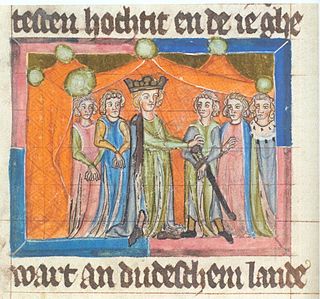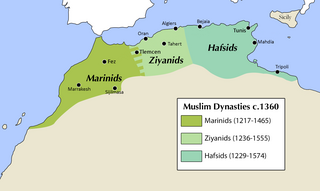
Year 1184 (MCLXXXIV) was a leap year starting on Sunday of the Julian calendar.

The Almohad Caliphate or Almohad Empire was a North African Berber Muslim empire founded in the 12th century. At its height, it controlled much of the Iberian Peninsula (Al-Andalus) and North Africa.
Alfonso VIII, called the Noble or the one of Las Navas, was King of Castile from 1158 to his death and King of Toledo. After having suffered a great defeat with his own army at Alarcos against the Almohads in 1195, he led the coalition of Christian princes and foreign crusaders who broke the power of the Almohads in the Battle of Las Navas de Tolosa in 1212, an event which marked the arrival of a tide of Christian supremacy on the Iberian Peninsula.

Muhammad al-Nasir was the fourth Almohad Caliph from 1199 until his death. Contemporary Christians referred to him as Miramamolin.

The Marinid Sultanate was a Berber Muslim empire from the mid-13th to the 15th century which controlled present-day Morocco and, intermittently, other parts of North Africa and of the southern Iberian Peninsula (Spain) around Gibraltar. It was named after the Banu Marin, a Zenata Berber tribe. The sultanate was ruled by the Marinid dynasty, founded by Abd al-Haqq I.

Abū Yūsuf Yaʿqūb ibn Yūsuf ibn Abd al-Muʾmin al-Manṣūr, commonly known as Yaqub al-Mansur or Moulay Yacoub, was the third Almohad Caliph. Succeeding his father, al-Mansur reigned from 1184 to 1199. His reign was distinguished by the flourishing of trade, architecture, philosophy and the sciences, as well as by victorious military campaigns in which he was successful in repelling the tide of the Reconquista in the Iberian Peninsula.

Battle of Alarcos, was fought between the Almohads led by Abu Yusuf Ya'qub al-Mansur and King Alfonso VIII of Castile. It resulted in the defeat of the Castilian forces and their subsequent retreat to Toledo, whereas the Almohads reconquered Trujillo, Montánchez, and Talavera.
This is a timeline of notable events during the period of Muslim presence in Iberia, starting with the Umayyad conquest in the 8th century.

Hassan Tower or Tour Hassan (Arabic: صومعة حسان; is the minaret of an incomplete mosque in Rabat, Morocco. It was commissioned by Abu Yusuf Yaqub al-Mansur, the third caliph of the Almohad Caliphate, near the end of the 12th century. The tower was intended to be the largest minaret in the world, and the mosque, if completed, would have been the largest in the western Muslim world. When al-Mansur died in 1199, construction on the mosque stopped. The minaret was left standing at a height of 44 meters. The rest of the mosque was also left incomplete, with only the beginnings of several walls and 348 columns being constructed. The tower, along with the remains of the mosque and the modern Mausoleum of Mohammed V, forms an important historical and tourist complex in Rabat.
Abu Muhammad Abd al-Wahid 'al-Makhlu' was the Almohad Caliph for less than a year in 1224.

Abu Muhammad ʿAbdallah 'al-ʿAdil' was an Almohad Caliph, a former governor in al-Andalus who challenged and secured the murder of his predecessor, Abd al-Wahid I. His 1224 coup ushered in a period of instability that lasted well beyond his own death in 1227. He is often regarded as one of the most disastrous of Almohad caliphs. His coup divided the Almohads and set in motion the loss of al-Andalus and the eventual collapse of the Almohad state.
Abu Yusuf Yaqub ibn Abd al-Haqq was a Marinid ruler of Morocco. He was the fourth son of Marinid founder Abd al-Haqq, and succeeded his brother Abu Yahya in 1258. He died in 1286. He was the son of Abd al-Haqq I and Oum el-Iman bint Ali el-Bethary, a Zenata woman. Some sources add her mother to be known as Oum el Youm and a daughter of a Zenata clan leader of the Tafersit region.

Almohad doctrine or Almohadism was the ideology underpinning the Almohad movement, founded by Ibn Tumart, which created the Almohad Empire during the 12th to 13th centuries. Fundamental to Almohadism was Ibn Tumart's radical interpretation of tawḥid—"unity" or "oneness"—from which the Almohads get their name: al-muwaḥḥidūn (المُوَحِّدون).

The Great Mosque of Salé, also known as the Masjid al-Tal'a, is a historic mosque in Salé, Morocco. It is the main mosque of the old city. Covering an area of 5,070 m2 (54,600 sq ft), it is the third-largest mosque in Morocco.

The Siege of Silves in 1190 was an military confrontation of the Reconquista, occurring during the sixth Almohad invasion of Portugal. The city of Silves, conquered by King Sancho I of Portugal the previous year, was besieged by a Muslim army, but the Portuguese resisted the attack.

The siege of Tomar was a military engagement that took place in 1190 between the Almohad caliphate who attacked the town of Tomar in Portugal, and the Templar Order, who owned the settlement and successfully defended it from the Muslim attack.

The Spanish Christian–Muslim War of 1172–1212 was fought between the Spanish Christian kingdoms of Castile, Aragon, Navarre and Portugal and the Almohad Caliphate during the Reconquista. It began when the Almohad caliph Yusuf I attacked Castile from Cuenca in 1172 and ended after the Christian victory at the Battle of Las Navas de Tolosa in 1212 but small skirmishes still occurred after the battle.
The Marinid campaign in Andalusia of 1277–1278 was the second campaign led by the Marinid Sultan Abu Yusuf Yaqub in the Iberian Peninsula. Supported by the Emir of Granada, Muhammad II of Granada, towards the end of the campaign, the Muslims ravaged the Christian territories without achieving any strategic conquests. Fearing a confrontation, the Castilian King Alfonso X requested peace, which was eventually signed on 25 February 1278.
The Raid of Lisbon occurred during the Almohad led by Yaqub al-Mansur campaigns against Christian forces in the Iberian Peninsula at 1189.

The Conquest of Tarragona in 1174 was one of Abu Yaqub Yusuf campaigns in eastern Al Andalus. He had invaded Iberia, ravaging Catalonia and conquering and Tarragona, the following year he established himself in Seville.













